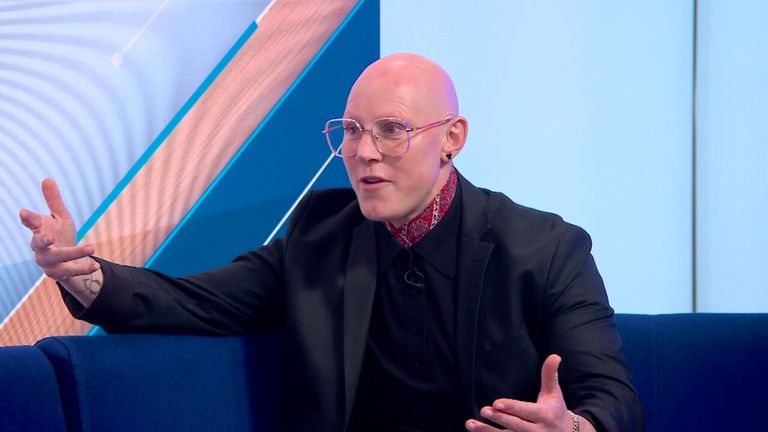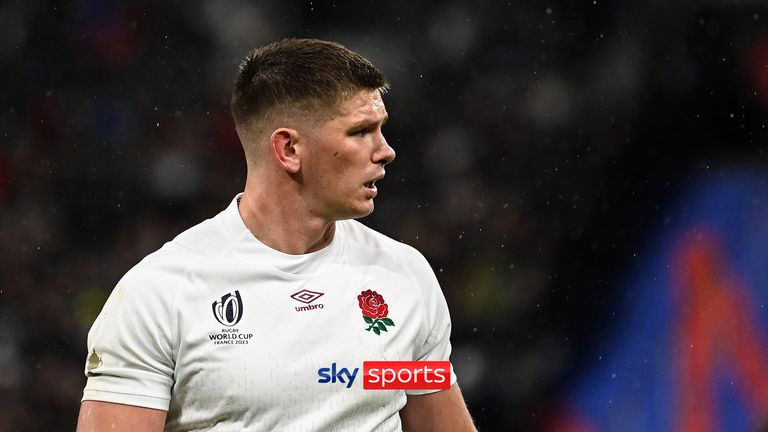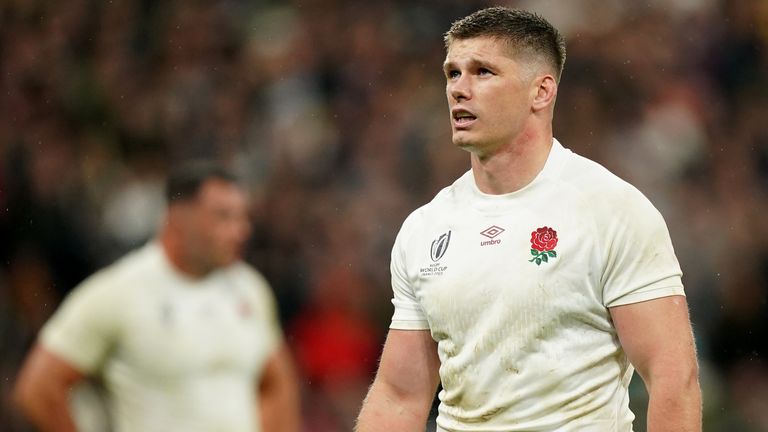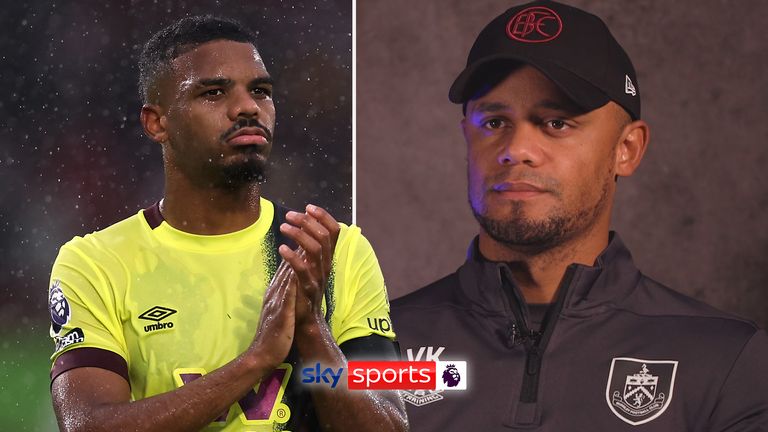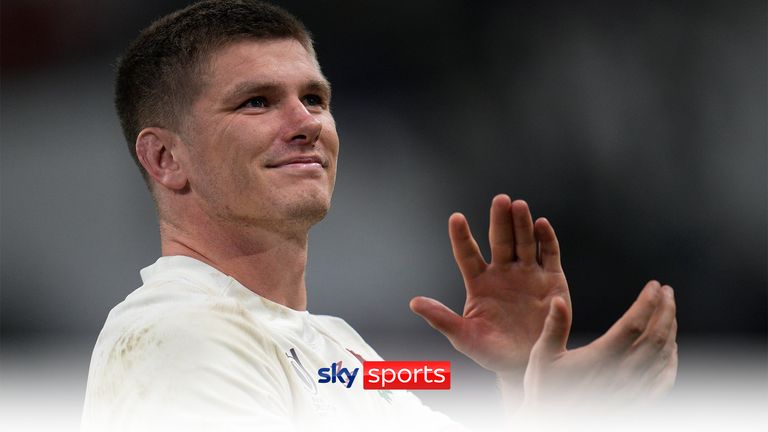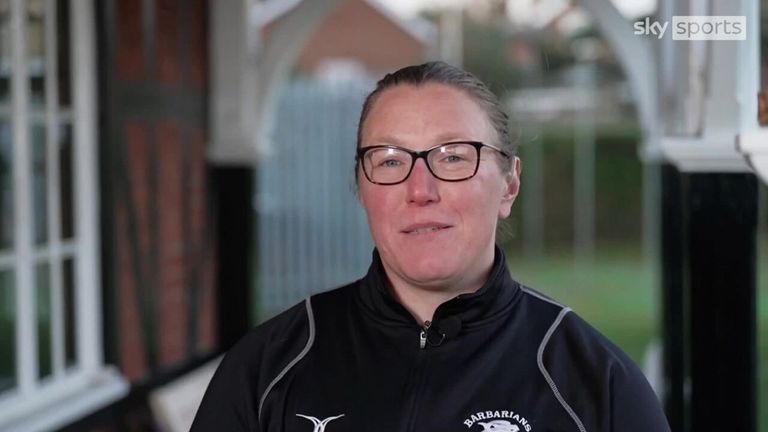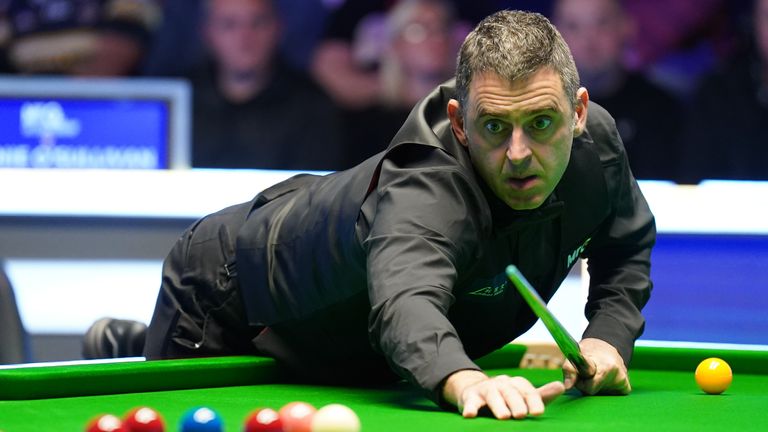Owen Farrell: Can England captain's decision help normalise mental health breaks in sport?
England rugby union captain Owen Farrell announced his decision to miss next year's Six Nations for mental health reasons on Wednesday; the 32-year-old has joined the likes of Simone Biles, Naomi Osaka and Ben Stokes in taking time out from their sporting career to address such issues

Friday 1 December 2023 12:40, UK
Heather Fisher has long been open about her own mental health struggles. From overcoming anorexia in her teenage years to struggling with body image after losing her hair due to alopecia, the former England rugby union international has laid bare the issues which have affected her.
It is why the 39-year-old, who enjoyed a stellar Red Roses career in the 15-a-side and sevens variants of the sport, was so heartened by men's captain Owen Farrell publicly stating his decision to step back from England duty for next year's Six Nations for the sake of his own mental health.
Farrell is one of the highest-profile sportspeople to date to open up about their need to prioritise their mental well-being, with American gymnast Simone Biles taking two years out before returning to action in August and tennis star Naomi Osaka having spent several months off the court following the 2021 French Open.
- Saracens boss Mark McCall blasts 'shameful' treatment of Owen Farrell
- England captain Owen Farrell to miss Six Nations to focus on mental well-being
Yet while that and the outpouring of support the 112-times capped fly-half or inside centre has received from those in the game is seen as a step forward by Fisher, the 2014 World Cup winner is in no doubt more needs to be done in terms of normalising conversations around mental health in sport.
"I think it's the biggest testament to rugby you can have," Fisher told Sky Sports News. "We talk about strength on the pitch, but the strongest thing you can be is open and vulnerable about something you can't see.
"If someone breaks their leg or someone is in a boot, we can see it and say, 'oh, mate, that's not great', and you can take time out, you've got a rehab plan and you can focus.
"When it's your mental health, I think it's still perceived as a weakness and something we are talking about. We haven't normalised mental health yet."
Farrell's decision came just over a month after England's 2023 Rugby World Cup campaign concluded with them finishing third and him surpassing Jonny Wilkinson as the national team's all-time leading point-scorer.
However, the 32-year-old faced criticism during the tournament and was booed by his own supporters when his name was read out over the PA ahead of the quarter-final win over Fiji, and former England centre Luther Burrell is concerned that Farrell has reached the point where he needs a break from the Test arena.
"It's very troubling that the pressure from outside of his job is what I believe is leading to him taking this time away," Burrell, who cited social media abuse as a factor as well, told Sky Sports News.
"It's a real turning point in time and, being a professional rugby player for over 15 years, I've been on the end of some of these keyboard warriors trying to pull you down when all you're trying to do is your best as a rugby player.
"It's not just on the field with Owen, he has that leadership role where he won't switch off where he goes home. He'll have to continue to work, he'll have to be doing analysis, he'll have to be doing preparations for meetings - he's the backbone of every side he's associated with.
"People need to show empathy at times like this because he is human, he does have a family, and he's done so much for the game of rugby and our country."
Neither is Farrell the only England captain to take a mental health break. Prior to his appointment as the cricket team's Test skipper, Ben Stokes spent six months out of the sport in 2021 after suffering from panic attacks following the death of his father, Ged, from brain cancer.
Premier League footballer Lyle Foster is currently undergoing treatment with the support of his club, Burnley, after approaching them to express his struggles with his mental well-being too, while former Clarets player Clarke Carlisle has experienced depression on several occasions.
Carlisle, who retired following a 16-year professional career in 2013, is another who has been open with his mental health struggles and lauded Farrell for recognising he needed to take a step back, although understands why it is difficult for others to be comfortable enough to do likewise.
"There's often a fear, especially with guys who are my generation or older, that the perception that people are going to judge you for this decision to take care of your well-being." Carlisle told Sky Sports News.
"When we see a case like Owen Farrell and think, 'if I take a step the world has to know' - it doesn't have to be like that. You don't have to be like myself or like Owen Farrell, you don't have to tell the world that you're addressing your well-being status, but it is imperative that you tell someone and the right someone and the right time.
"I think people are more aware of the help that is available but not competent or confident enough to know exactly who to approach and when to approach them.
"How did he [Farrell] know that he got to that point? There's a level of self-awareness there where he knew there was something to address. What got me to crisis point is that I didn't have that self-awareness."
That is something Fisher is cognisant of as well and she feels the differences between the world of professional sport from everyday life and being in that highly competitive environment brings its own unique challenges when discussing mental health.
"In the normal world, outside of sport, if you're having a bad day or a bad week you say, 'hey, I'm struggling, I need time out'," Fisher said.
"As an athlete, we're entertainers and I think sometimes I forget we forget we're there to entertain because in our world it means everything to us.
"We want to perform the best we can be, so the fact everyone is speaking out is what every sport needs, but it shouldn't be something we are putting on the news.
"It should be something we embrace and say, 'it's good you're speaking out' - then move on. Just because you can't see it doesn't mean it's not important and we are building the awareness still, and it shows we need it."
Those who compete in team sports do, at least, have a support network of team-mates and coaches they can fall back on, but for those in individual disciplines it can be even harder to find somewhere to turn.
WBC heavyweight boxing champion Tyson Fury has previously detailed the struggles he has endured, while seven-time world snooker champion Ronnie O'Sullivan recently opened up on how his struggles to cope with the expectations he has of himself have led to issues.
"I have an inability to deal with pressure than I put on myself," O'Sullivan told Sky Bet's The Overlap podcast. "I get in such a bad place, I get so down on myself then I become a moody person, I become someone I don't really like. It's more like well-being thing, can I play snooker and be happy?
"Sometimes I'd play and I'd have blisters on my fingers. In preparation for a tournament I'd play hours and hours and think I've got to get it right.
"My fingers would be so sore that when I come to play a tournament, I couldn't put my hands on the table. I was over practising and when I got to the tournament, I was burnt out, it's just finding the optimum level.
"[It was the] Worst time of my life. I've let myself down, I hated myself."
For all that she is pleased athletes are no longer afraid to be public about mental health issues or say they need to take time out though, Fisher's ultimate hope is to reach the point where anyone opting to take a break for their well-being is not newsworthy.
"We just need to be able to openly talk about it in all walks of life and we are not doing that yet," Fisher said.
"I think it is still a taboo, I think it's still seen as a weakness, because we wear a clown suit.
"Behind every performer is a person and a human being with a brain, a soul, and an inside, and we have to rectify that to make sure we get the performance."
Support for our viewers
If you are affected by any of the issues covered in this article, please see the list of organisations below which can offer you help, support and further information.
Samaritans offer confidential, non-judgemental emotional support, 24 hours a day for people who are experiencing feelings of distress, despair or suicide. Call 116 123, email jo@samaritans.org or visit samaritans.org for more information.
Campaign Against Living Miserably (CALM) aims to prevent male suicide in the UK and offers anonymous, confidential listening, information, advice and support. Call 0800 58 58 58 (5pm-12am) or visit thecalmzone.net for more information.
Papyrus raises awareness and offers prevention training, provides confidential support and suicide intervention advice through HOPELineUK. Call 0800 068 41 41 (Monday - Friday 10am - 10pm, Weekends 2pm - 10pm, Bank Holidays 2pm- 5pm), email pat@papyrus-uk.org, text 07786209697 or visit papyrus-uk.org for more information.
Mind offers advice and support to empower anyone experiencing a mental health problem. Call 0300 123 3393 (Monday - Friday 9am - 6pm), email info@mind.org.uk, or visit mind.org.uk for more information.
The NHS website offers specific advice on ways to find information and support for your mental health. Visit nhs.uk/mentalhealth for more information.
Rethink Mental Illness is a charity which offers advice and support for all those affected by mental illness, including their carers, family and friends. Call freephone 0808 801 0525 (9.30-4pm Monday to Friday), 0121 522 7007, email info@rethink.org or find out more information at www.rethink.org.
YoungMinds are a mental health charity offering support for children, young people, and their parents. If you are a young person struggling to cope, text YM to 85258 for free, 24/7 support or visit their support pages at www.youngminds.org.uk. There is also a free support line for parents who may have concerns about their child/young person - 0808 802 5544 - open 9.30am-4pm, Monday - Friday.
